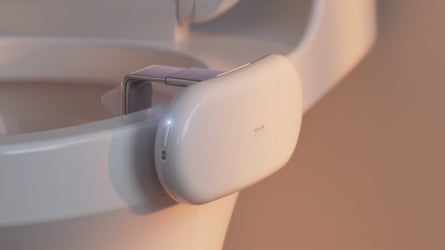You can buy a smart ring to track your sleep activity or a smartwatch to monitor your heartbeat, so perhaps it makes sense that health tech’s next frontier has come for your toilet. Behold: Dekoda, Kohler’s new toilet cam. No, not that type of toilet cam: this one only shoots pictures down at what is inside the bowl, sending the snaps to an app that analyzes stool samples and rates your gut health. The Dekoda can be yours for $599, plus an annual subscription fee.
Kohler’s new product joins Throne, a $319 offering from an Austin-based startup. “Throne captures stool and hydration patterns, hands-free and automatically,” the camera’s description reads. “Notice shifts sooner, fine-tune daily choices, and feel more confident, every day.”
You might wonder: Who is this for? Slovenian philosopher Slavoj Žižek once noted that traditional German toilets have “poo shelves”, where “shit is first laid out for us to sniff and inspect for traces of illness,” while French toilettes have a hole in a back, to make feces “disappear as quickly as possible”. Somewhere in the middle are American toilets, “a basin full of water, so that the shit floats in it, visible, but not to be inspected”.
Clearly Žižek has not spent enough time on TikTok; in an optimization-obsessed world, stoolgazing has become nearly as popular as sleep-tracking or counting steps. People share their “poop logs” on the app, recording every time they number two each month. “I have pooped 329 days this year,” one woman said in a 2024 TikTok. “A poop weighs about ¼[lb] to 1lb. So if you take it at ¼, that’s about 131 pounds that I pooped this year.”
The Bristol stool scale, a clinical assessment tool developed by doctors to classify samples into seven different categories – with types three (“like a sausage but with cracks on it”) and four (“like a sausage or snake, smooth and soft”) being the gold standard – frequently makes appearances on gut health influencers’ social media pages.
The chart helps doctors diagnose irritable bowel syndrome (IBS), which was once a diagnosis one might keep to oneself. Not any more: in 2022, the magazine Allure proclaimed “We Are Entering an Age of IBS Empowerment,” with more doctors studying the syndrome, and women rallying around the theory that “hot girls have stomach issues”.
“People think waste is something you flush away, but it really contains a lot of insights about us,” says Kash Kapadia, the CEO of Kohler Health. “It literally comes from us, and now we can study it in a way that doesn’t require you to handle it.”
The device starts working as soon as a user decides to “start the session”, with the tap of their fingerprint. “Right at the time when your urine hits the water level of the toilet, the camera will start flashing its LED light,” Kapadia says. The pictures then get uploaded to Kohler’s cloud and are analyzed through “proprietary algorithms” which take about three to five minutes to process before the results are visible on the user’s app.

Though Kohler says the camera boasts “privacy-first features” such as fingerprint authentication and end-to-end encryption, it’s understandable that many would not trust a toilet-tracking cam.
Joana Gaia, a clinical professor of management science who studies health data systems, says that the idea of a poop camera is “less invasive” than a Fitbit or Apple Watch, which collects more data. “Kohler is not a medical organization, so they are not covered by Hipaa [the US law on medical privacy],” she adds. “This is something that comes up a lot with apps that are healthcare-related.”
(When 23andMe, the at-home genetic testing company filed for bankruptcy, many feared it would sell data from more than 14 million customers to a third party. In the end the data went to a non-profit founded by the company’s former CEO Anne Wojcicki, who intends to use it for medical research.)
“The concern for me comes from what data [the Dekoda] collects,” Gaia adds. “Who owns all this data, and what could they potentially do with it?”
“We recognize that this is a very personal space, and we’ve taken that very seriously in how we designed for privacy and security,” Kapadia says. Though the Dekoda shares anonymized poop data with unspecified business “partners”, it will not share the data with a physician or family members. As of now, the Dekoda does not share its data with Apple Health or Google, but Kapadia says that could change “if people want that”.
Amanda Sauceda, a registered dietitian based in Long Beach, California, is not exactly surprised that poop cameras exist. “I think especially with the rise in colon cancer among young people, there are more conversations about actually looking at what is inside the toilet bowl,” she says, referencing the sharp increase of the disease in people under 50, which many experts attribute to ultra-processed foods. “It’s another way [for companies] to capitalize on that.”
She worries that too much attention placed on a poop’s appearance could be detrimental. “There’s this idea in gut health that you’re striving for this big, beautiful, smooth, snake-like poop all the time, when that’s really just not realistic,” she says. “I could see how these devices could make people obsessed with chasing the ‘ideal gut’.”
Ashley Oswald, a Minneapolis-based registered dietitian, adds that the bacteria in stool changes within two days of a new diet, which could lessen the importance of timely poop data. “Is it even that useful to know about the bacteria in your stool when it could all change within two days?” she asked. “We’re losing sight of the basics when we chase trends. It’s interesting and fun to track your poop, but how many people are doing things that significantly influence the gut, such as eating enough fiber or being active?”
Sauceda tracks her own movements using the Bristol chart. “I always say that looking at your poop is like a report card: it’s a good way for us to know what is going on inside our gut,” she says. “You don’t always feel differently when you take a probiotic, but I definitely feel different if I don’t poop every day.” Sauceda’s method of tracking is entirely free. “You don’t need a fancy camera to look at your poop.”

 3 months ago
70
3 months ago
70

















































